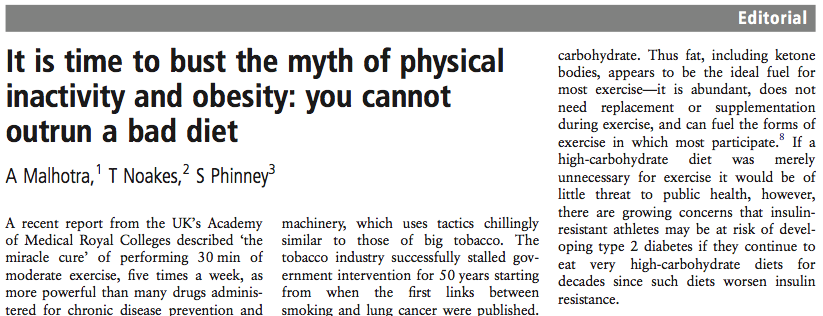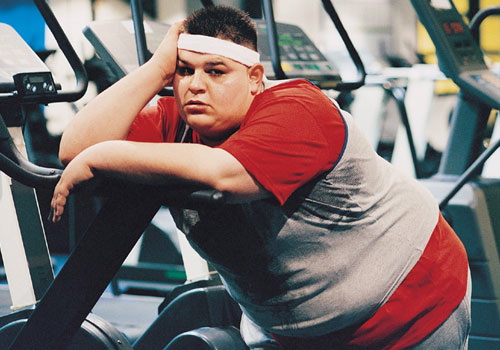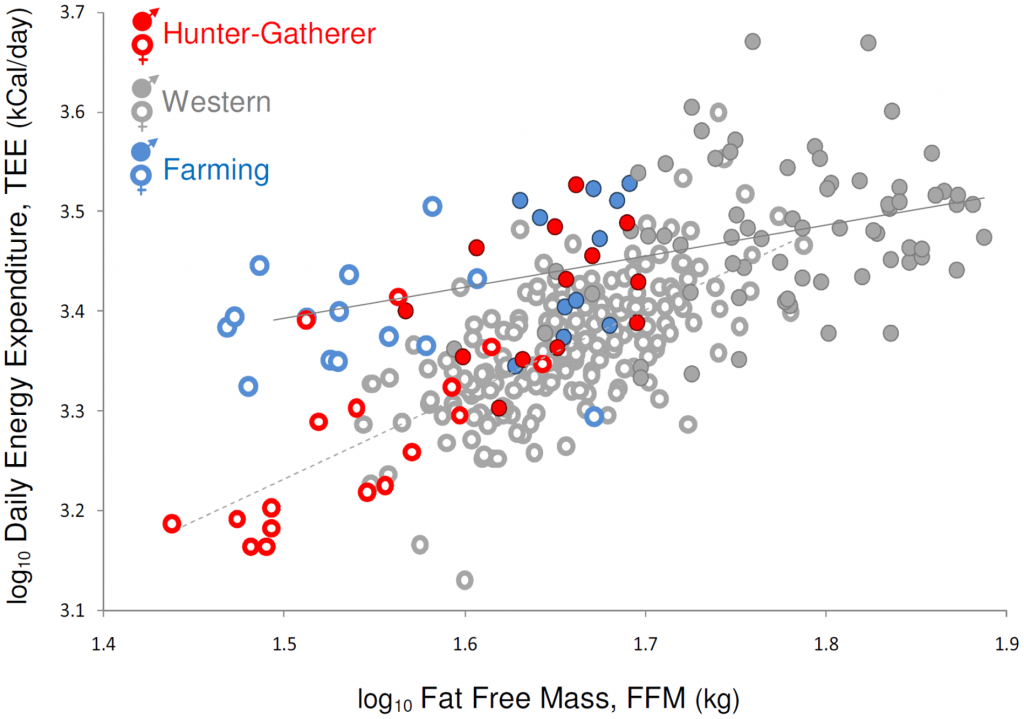It’s been just about a year since Eat Meat And Stop Jogging was released, so I like to think this new editorial in the British Journal of Sports Medicine is my anniversary gift:

The paper discusses many of the same misconceptions reviewed in the book, including the sad reality that exercise is good for your health, but a useless intervention for weight loss:
“Regular physical activity reduces the risk of developing cardiovascular disease, type 2 diabetes, dementia and some cancers by at least 30%. However, physical activity does not promote weight loss.”
Moreover, it goes on to tell us that dietary intervention (or a fat burning diet) is the only reasonable solution for an obese, diabetic and pre-diabetic population. Citing this recently published paper from the journal Nutrition.
“…dietary carbohydrate restriction is the single most effective intervention for reducing all the features of the metabolic syndrome and should be the first approach…”

The first reason MORE exercise doesn’t work for fat loss is because most of the energy we burn on a day-to-day basis is determined by our resting metabolic rate (RMR). And as we’ve discussed, our body will naturally decrease this energy-burning rate when it’s in a caloric deficit.
But what’s worse, is that if our exercise efforts revolve around ‘burning’ (aka cardio) and our dietary efforts revolve around ‘losing’ (aka calorie-restriction) we end up sacrificing muscle mass that would otherwise maintain that RMR (the bulk of our burning potential) and help us burn fat.
In other words:
Those exercising for “weight loss” spend a great deal of time and effort burning a small amount of calories, only to end up reducing their daily non-exercise burning rate (that burns A LOT of calories!).
And that’s before consider the fact that your body has other ways of adjusting for the energy deficit you’re exposing it to, like trying to access more calories via increased hunger.
Meaning, no matter how hard you try to eat less and burn more, this physiological adaptation (that’s outside your control) will have you eating more, burning less, or both(1, 2). Because, frankly, it doesn’t give a crap what our fat loss goals are.
All your body cares about is making sure it has enough fuel to function and survive.
Basically, you’re going to start getting very hungry, very lazy, or both. Making you eat more than you should, do less than you want (or do it poorly), and eventually find yourself exercising a lot just to maintain…and even gain!

Harsh reality I know, but this is what happens when you play the calories-in, calories-out game. And sadly, even if you are disciplined enough to fight the hunger and low-energy, and continue hitting the pavement, there’s plenty of other ways to get calories. With muscle loss being the first adjustment, but disrupted reproductive health, and immune suppression coming shortly after – since these are non-essential (or non life-threatening) systems compared to something like the brain.
(Don’t believe me? Ask the menstrual-less marathon monkeys and frequently-sick figure competitors)
The good news is, there’s no need to go to these extremes; as:
The obesity problem is not from a lack of exercise (or an excess of calories) – it’s from a diet misaligned with our genetic past!
A point that was demonstrated perfectly in a study from 2012 in the journal PLoS One, where researchers showed that the daily energy expenditure of physically active hunter-gatherers (the Hadza) isn’t much different than desk-bound North Americans.

Re-iterating the fact that they stay lean and disease-free because they’re not eating the grain-dominated, belly fat forming carb-age we consume in the Western world. And implying that you can too if you’re willing to accept that “eating right” (and not “moving more”) is the key to becoming a fat burner – like this 2006 Cochrane Review demonstrated.
But all that being said, what exercise CAN do, is improve the biomarkers for disease prevention and long-term health; so just because it doesn’t do much for your waistline (1, 2), doesn’t mean you shouldn’t do it. With this same Cochrane review study showing considerable reductions in cardiovascular and metabolic biomarkers (blood pressure, triglycerides, fasting glucose, etc). And this analysis from BMC Public Health showing significant improvements in cognitive function.
…Both from simply walking!

And more importantly, if you spend your fitness time ‘building’ instead of burning, you can prevent the muscle and bone loss, and reductions in strength and RMR typically experienced with aging. Which are factors that are far more important for your healthspan, and factors that will give you the body you’ve always wanted…
…provided you’re willing to fix your diet, of course.
Stay Lean!
Coach Mike
RELATED ARTICLES:
Walking is a Man's Best Medicine
Cardio - The Worst Investment Ever?
5 Very Good Reasons To Stop Counting Calories
Exercise Intensity Trumps Exercise Duration For Disease Prevention

